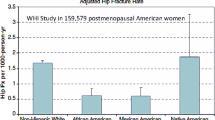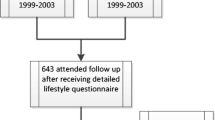Abstract
Summary
Surrogate measures of fracture risk, such as effects on bone mineral density, may be of great interest to assess the efficacy of available osteoporosis treatments. Our results suggest that bone mineral density (BMD) changes cannot be used as a surrogate of anti-fracture efficacy, among patients receiving calcium, with or without vitamin D.
Introduction
The purpose of this study is to examine the association between changes in bone mineral density with reduction in the risk of fractures in patients receiving calcium with or without vitamin D.
Methods
We selected all randomized placebo-controlled clinical trials of calcium with or without vitamin D supplementation. To be included in this analysis, the studies were required to report both BMD (hip/proximal femur and/or lumbar spine) and the incidence of fractures. Meta-regression analyses were used to examine the associations of changes in BMD with reduction in risk of fracture over the duration of each study. The change in BMD was the difference between changes (from baseline) observed in the active treatment group and placebo group.
Results
A total of 15 randomized trials (n = 47,365) were identified, most of whom (77%) came from the Women’s Health Initiative trial. Results show that larger increases in BMD at the lumbar spine were not associated with greater reduction in fracture risk. Concerning hip BMD changes, we found a statistically significant relationship between hip BMD changes and reduction in risk. However, results were not quite significant after excluding the both largest studies, in which BMD changes were measured in very small subset of patients. These points may have largely biased our results.
Conclusions
In conclusion, there was no evidence of a relationship between BMD changes and reduction in risk of fractures among patients receiving calcium with or without vitamin D supplementation. Calcium and/or Vitamin D may reduce fracture rates through a mechanism independent of bone density.




Similar content being viewed by others
References
Delmas PD (2002) Treatment of postmenopausal osteoporosis. Lancet 359:2018–2026
Temple RJ (1995) A regulatory authority’s opinion about surrogate endpoints. In: Nimmo WS, Tucker GT (eds) Clinical measurement in drug evaluation. Wiley, New York
Li Z, Chines AA, Meredith MP (2004) Statistical validation of surrogate endpoints: is bone density a valid surrogate for fracture? J Musculoskelet Neuron Interact 4:6474
Bouxsein ML, Delmas PD (2008) Considerations for development of surrogate endpoints for antifracture efficacy of new treatments in osteoporosis: a perspective. J Bone Miner Res 23:1155–1167
Boonen S, Body JJ, Boutsen Y, Devogelaer JP, Goemaere S, Kaufman JM, Rozenberg S, Reginster JY (2005) Evidence-based guidelines for the treatment of postmenopausal osteoporosis: a consensus document of the Belgian Bone Club. Osteoporos Int 16:239–254
Rizzoli R, Boonen S, Brandi ML, Burlet N, Delmas P, Reginster JY (2008) The role of calcium and vitamin D in the management of osteoporosis. Bone 42:246–249
Tang BM, Eslick GD, Nowson C, Smith C, Bensoussan A (2007) Use of calcium or calcium in combination with vitamin D supplementation to prevent fractures and bone loss in people aged 50 years and older: a meta-analysis. Lancet 370:657–666
Jadad AR, Moore RA, Carroll D, Jenkinson C (1996) Assessing the quality of reports of randomized clinical trials: is blinding necessary? Control Clin Trials 17:1–12
Begg CB, Mazumdar M (1994) Operating characteristics of a rank correlation test for publication bias. Biometrics 50:1088–1101
Egger M, Davey Smith G, Schneider M, Minder C (1997) Bias in meta-analysis detected by a simple graphical test. BMJ 315:629–634
Hatal R, Keitz S, Wyer P, Guyatt G, on behalf of the Evidence-Based Medicine Teaching Tips Working Group (2005) Tips for learners of evidence-based medicine: 4. Assessing heterogeneity of primary studies in systematic reviews and whether to combine their results. CMAJ 172:661–665
Reid IR, Ames RW, Evans MC, Gamble GD, Sharpe SJ (1993) Effect of calcium supplementation on bone loss in postmenopausal women. N Engl J Med 328(7):460–464
Chevalley T, Rizzoli R, Nydegger V, Slosman D, Rapin CH, Michel JP, Vasey H, Bonjour JP (1994) Effects of calcium supplements on femoral bone mineral density and vertebral fracture rate in vitamin-D-replete elderly patients. Osteoporos Int 4:245–252
Riggs BL, O’Fallon WM, Muhs J, O’Connor MK, Kumar R, Melton LJ 3rd (1998) Long-term effects of calcium supplementation on serum parathyroid hormone level, bone turnover, and bone loss in elderly women. J Bone Miner Res 13:168–174
Peacock M, Liu G, Carey M, McClintock R, Ambrosius W, Hui S, Johnston CC (2000) Effect of calcium or 25OH vitamin D3 dietary supplementation on bone loss at the hip in men and women over the age of 60. J Clin Endocrinol Metab 85:3011–3019
Fujita T, Ohue M, Fujii Y, Miyauchi A, Takagi Y (2004) Reappraisal of Katsuragi calcium study, a prospective, double-blind, placebo-controlled study of the effect of active absorbable algal calcium (AAACa) on vertebral deformity and fracture. J Bone Miner Metab 22(1):32–38
Reid IR, Mason B, Horne A, Ames R, Reid HE, Bava U, Bolland MJ, Gamble GD (2006) Randomized controlled trial of calcium in healthy older women. Am J Med 119:777–785
Prince RL, Devine A, Dhaliwal SS, Dick IM (2006) Effects of calcium supplementation on clinical fracture and bone structure: results of a 5-year, double-blind, placebo-controlled trial in elderly women. Arch Intern Med 166:869–875
Reid IR, Ames R, Mason B, Reid HE, Bacon CJ, Bolland MJ, Gamble GD, Grey A, Horne A (2008) Randomized controlled trial of calcium supplementation in healthy, nonosteoporotic, older men. Arch Intern Med 168(20):2276–2282
Chapuy MC, Arlot ME, Duboeuf F, Brun J, Crouzet B, Arnaud S, Delmas P, Meunier PJ (1992) Vitamin D3 and calcium to prevent hip fractures in elderly women. N Engl J Med 327:1637–1642
Dawson-Hughes B, Harris S, Krall E, Dallal G (1997) Effect of calcium and vitamin D supplementation on bone density in men and women 65 years of age or older. N Engl J Med 337:670–676
Chapuy MC, Pamphile R, Paris E, Kempf C, Schlichting M, Arnaud S, Garnero P, Meunier PJ (2002) Combined calcium and vitamin D3 supplementation in elderly women:confirmation of reversal of secondary hyperparathyroidism and hip fracture risk: the Decalyos II study. Osteoporos Int 13:257–264
Harwood RH, Sahota O, Gaynor K, Masud T, Hosking DJ (2004) A randomised, controlled comparison of different calcium and vitamin D supplementation regimens in elderly women after hip fracture: the Nottingham Neck of Femur (NoNOF). Study Age Ageing 33(1):45–51
Jackson RD, LaCroix AZ, Gass M, Wallace RB, Robbins J, Lewis CE, Women’s Health Initiative Investigators et al (2006) Calcium plus vitamin D supplementation and the risk of fractures. N Engl J Med 354:669–683
Bolton-Smith C, McMurdo ME, Paterson CR, Mole PA, Harvey JM, Fenton ST, Prynne CJ, Mishra GD, Shearer MJ (2007) Two-year randomized controlled trial of vitamin K1 (phylloquinone) and vitamin D3 plus calcium on the bone health of older women. J Bone Miner Res 22(4):509–519
Salovaara K, Tuppurainen M, Kärkkäinen M, Rikkonen T, Sandini L, Sirola J, Honkanen R, Alhava E, Kröger H (2010) Effect of vitamin D3 and calcium on fracture risk in 65- to 71-year-old women: a population-based 3-year randomized, controlled trial—The OSTPRE-FPS. JBMR 25:1487–1495
Sarkar S, Mitlak BH, Wong M, Stock JL, Black DM, Harper KD (2002) Relationships between bone mineral density and incident vertebral fractures with raloxifene therapy. J Bone Miner Res 17:1–10
Watts NB, Cooper C, Lindsay R et al (2004) Relationship between changes in bone mineral density and vertebral fracture risk associated with risedronate: greater increases in bone mineral density do not relate to greater decreases in fracture risk. J Clin Densitom 7:255–261
Li Z, Meredith MP, Hoseyni MS (2001) A method to assess the proportion of treatment effect explained by a surrogate endpoint. Stat Med 20:3175–3188
Hochberg MC, Ross PD, Black D, Fracture Intervention Trial Research Group et al (1999) Larger increases in bone mineral density during alendronate therapy are associated with a lower risk of new vertebral fractures in women with postmenopausal osteoporosis. Arthritis Rheum 42:1246–1254
Bruyère O, Roux C, Badurski J et al (2007) Relationship between bone mineral density changes and fracture risk reduction in patients treated with strontium ranelate. J Clin Endocrinol Metab 23:3076–3081
Wasnich RD, Miller PD (2000) Antifracture efficacy with antiresorptive agents are related to changes in bone density. J Clin Endocrinol Metab 85:231–236
Cummings SR, Karpf DB, Harris F, Genant HK, Ensrud K, LaCroix AZ, Black DM (2002) Improvement in spine bone density and reduction in risk of vertebral fractures during treatment with antiresorptive drugs. Am J Med 112:281–289
Hochberg MC, Greenspan S, Wasnich RD, Miller P, Thompson DE, Ross PD (2002) Changes in bone density and turnover explain the reductions in incidence of nonvertebral fractures that occur during treatment with antiresorptive agents. J Clin Endocrinol Metab 87:1586–1592
Delmas PD, Seeman E (2004) Changes in bone mineral density explain little of the reduction in vertebral and nonvertebral fracture risk with anti-resorptive therapy. Bone 34:599–604
Bauer DC, Black DM, Garnero P, Hochberg M, Ott S, Orloff J, The Fracture Intervention Trial Study Group et al (2004) Change in bone turnover and hip, non-spine, and vertebral fracture in alendronate-treated women: the fracture intervention trial. J Bone Miner Res 19:1250–1258
Compston J (2009) Monitoring osteoporosis treatment. Best Pract Res Clin Rheumatol 23:781–788
International Society for Clinical Densitometry. Official positions. Available at: www.iscd.org
National Osteoporosis Foundation. New clinicians guide to prevention and treatment of osteoporosis. Available at: www.nof.org
Thompson S, Higgins J (2002) How should meta-regression analyses be undertaken and interpreted? Stat Med 21:1559–1573
Lambert P, Sutton A, Abrams F et al (2002) A comparison of summary patient-level covariates in meta-regression with individual patient data meta-analysis. J Clin Epidemiol 55:86–94
Acknowledgments
This study has been supported by a research grant from Nycomed. However, Nycomed had no control in study design, data collection and analysis, interpretation of data, in the writing of the report, and in the decision to submit the paper for publication.
Conflicts of interest
No particular conflict of interest for this particular study. However, Véronique Rabenda, Olivier Bruyère, and Jean-Yves Reginster have received research grants and/or consulting fees from pharmaceutical companies.
Author information
Authors and Affiliations
Corresponding author
Rights and permissions
About this article
Cite this article
Rabenda, V., Bruyère, O. & Reginster, JY. Relationship between bone mineral density changes and risk of fractures among patients receiving calcium with or without vitamin D supplementation: a meta-regression. Osteoporos Int 22, 893–901 (2011). https://doi.org/10.1007/s00198-010-1469-x
Received:
Accepted:
Published:
Issue Date:
DOI: https://doi.org/10.1007/s00198-010-1469-x




